Guest essay by Ernest A. Canning
 It is vital that the American people come to appreciate the danger to liberty as well as community posed by doctrinaire libertarianism.
It is vital that the American people come to appreciate the danger to liberty as well as community posed by doctrinaire libertarianism.
Despite widespread coverage of Rand Paul's absurd criticism of the provisions of the 1964 Civil Rights Act as applied to private businesses, there has been a dearth of analysis as to how this absurdity was brought about by the serious intellectual deficiencies in doctrinaire libertarian philosophy; a philosophy which led to a second astounding Rand Paul remark.
In the face of horrendous safety records on the part of both Massey Energy, which had been found to have violated federal safety regulations thousands of times over the past several years, and BP, which had steadfastly fought off safety measures for deep water oil rigs, Rand summarily dismissed the significance of both the deadly West Virginia mine disaster and the deadly explosion at BP's deep water facility that has produced the worst oil spill in U.S. history with the cavalier, "accidents happen."
What Rand Paul has done is open a window into "libertarianism," which, contrary to the current Wikipedia definition, does not merge into "anarchism." The principle distinction arises because, as explained by Noam Chomsky, anarchism challenges not only authoritarian government but all authoritarian societal structures, including the work place.
Libertarians like Ron and Rand Paul focus exclusively on individual liberty vis-a-vis the government. They fail to appreciate that, especially in the 21st Century, the removal of government as a check against unfettered corporate wealth and power leads to "the tyranny of a corporate controlled economy"...
Firestorm
As observed by Juan González of Democracy Now! (video below), Rand Paul, the Republican candidate for a U.S. Senate seat in Kentucky, set off a "firestorm" of controversy when he criticized those portions of the 1964 Civil Rights Act which applied to private businesses, implying, when he appeared on MSNBC's Rachel Maddow Show, that the 46-year old federal legislation infringed on the First Amendment rights of private businesses.
RAND PAUL:...I don’t believe in any discrimination. I don’t believe that any private property should discriminate either...But what you have to answer, when you answer...is an abstract, obscure conversation from 1964...you have to say then that you decide the rules for all restaurants. And then, do you decide that you want to allow them to carry weapons into restaurants?
As observed by Prof. Blair Kelley on Democracy Now, Rand Paul's public/private distinction bears an eerie resemblance to pro-segregationist arguments that older Americans like myself can all too well remember. Amy Goodman discusses a fact, first reported by the blog barefoot and progressive, that "Rand Paul’s former communications director, Christopher Hightower...resigned in December after his MySpace page was found to have a post declaring 'Happy N-Word Day'—but it used the full word—and showing a photo of a lynching around the time of the federal Martin Luther King, Jr. holiday."
But it is a serious mistake to believe that Rand Paul's position is either motivated by racism or that this entailed a not-ready-for-prime-time gaffe of a neophyte politician, as suggested by the commentator to Brad Friedman during a May 21 segment on Russian TV. To the contrary, as Friedman noted, Rand Paul's remarks flow directly from the "doctrinaire libertarian" philosophy more clearly articulated by Rand's father, Ron Paul (R-TX) and the principles espoused by the original "Tea Party Movement" during the 2007/2008 Republican primary campaign before the movement was both co-opted and corrupted by the neo-fascist and health care industry-funded "Freedom Works," under the auspices of former House Majority Leader
The problem is not lack of sincerity on the part of Ron or Rand Paul. It is a matter of the serious deficiencies in a philosophy which focuses exclusively on individual liberty, but, in fairness, I will cover first the positives in terms of policy that Ron Paul's principled libertarianism produced.
Ron Paul policies that enticed progressive support
If you haven't done so, you would do well to watch the series of videos posted by Brad Friedman as he distinguished the principled policy positions advocated by Ron Paul from the empty rhetoric of the 21st Century "know-nothings" aka the "Tea Baggers."
At a time when the Bush/Cheney regime was running roughshod over civil liberties and pursuing imperial conquest overseas, Ron Paul not only opposed the perpetual wars being waged in Afghanistan and Iraq but challenged the wisdom of maintaining an Empire. "We’re spending nearly a trillion dollars a year on a machine maintaining this empire….We are literally spending ourselves into oblivion," Ron Paul said, adding:
This whole idea that we’re supposed to sacrifice liberty for security…Don’t we remember that when you sacrifice liberty for security, you lose both?
Ron Paul's son, Rand, has staked-out a principled position against corporate welfare, stating:
Rand falls short of his father's principled libertarianism
Unfortunately, some of Ron Paul's principled policies do not appear to be fully shared by his son, Rand, who states at his campaign web site that he favors the trial of "terrorists captured on the battlefield in military tribunals" and believes "the primary Constitutional function of the federal government is national defense." Although Rand told AntiWar.com's libertarian-leaning Scott Horton that he was opposed to torture, he was also opposed to bringing George Bush before the bar of justice for war crimes, expressing what bordered on "the King can do no wrong" concept by noting that there were "arguments as to whether a President can be tried."
Robert Scheer stated:
Rand not only confirmed Scheer's observations during the Scott Horton interview, but enhanced concerns when he appeared incapable of distinguishing between al Qaeda and the Taliban, though he did say that he was opposed to a long-term occupation of Afghanistan.
Libertarian blind spots
There are two areas in which libertarian philosophy leads to absurdity.
a) Individual liberty without civic responsibility is destructive of community, an equitable economy and the environment
While no one doubts that individual liberty is vital in a free society, societies do not consist of groupings of autonomous individuals whose "liberties" never come into conflict. The libertarian concept of an unlimited right of individuals and corporations to pursue wealth, along with their misplaced reliance on "market fundamentalism," ignores the basic obligations we owe one another and to our planet whose ecological balance is vital to the very survival of our species.
While libertarians rail against "big government," the real problem is not government per se but the extent to which the very purpose of government has been corrupted by special interests.
A brief examination of the principles espoused by Res Publica, "a community of public sector professionals dedicated to promoting good governance, civic virtue and deliberative democracy" elucidates the folly in exclusively focusing on "individual liberties."
Do we pursue our self interests all the time, or do we strive for compassion, courage, truth, and dedication? Do pursuits of status, money, or success distract us from what really matters to us?
Citizenship entails more than individual liberties. It entails co-responsibility towards one-another, towards our local, state, national and world communities.
Brad Friedman's recent observation that Rand Paul "calls for removing government entirely from all but those functions called for directly in the Constitution" is only partially accurate. While Rand Paul recognizes one of the core purposes set forth in the Constitution's Preamble (to provide for the common defense), Rand ignores a second, vital purpose (to promote the general welfare). Thus, Rand "has spoken about abolishing the Department of Education, the Drug Enforcement Agency, and perhaps the Department of Agriculture." He "has expressed serious concerns about the Americans with Disabilities Act," and, despite the provisions of the 16th Amendment which authorizes the federal government to collect an income tax, Rand Paul has gone so far as to question the government's right to do so.
This too is consistent with libertarian philosophy.
Because libertarians focus exclusively on individual liberty, they see taxes as a burden rather than part of a mutual obligation we all owe to ourselves and to our society.
Yet it is the anti-tax, anti-government rhetoric which sways many of the less than well informed "Tea Party" followers who fail to understand that the true culprit is not "big government" but a "broken government" which lacks democratic accountability precisely because it has been corrupted by the very same economic elites who have taken over the "Tea Party movement."
Under the cover of anti-government rhetoric, the hard-right, aided in no small measure by the corporate sector of the Democratic Party, has transferred power from public to private hands. The transfer is so pervasive that many laws have not merely been written on behalf of, but actually written by corporate lobbyists. Government agencies, like the Department of Agriculture, which were created to control corporate abuses of power have been emasculated because the people appointed to run those agencies hail from the very industries these federal agencies were intended to regulate.
The answer is not to abolish an agency like the Department of Agriculture, as Rand Paul proposes, but to eliminate the conflict between the public and private interest by removing all industry-connected political appointees and replacing them with individuals devoted to the public interest.
The problem is not democracy but what Chomsky described in Failed States as the "democracy deficit"—the significant gap between the policy positions of the American electorate and their elected "representatives;" a gap made possible because of the substance deficit in the corporate owned media and the deceptive means by which elections are determined by one-sided propaganda (paid-for political ads) that only billionaires and corporate-favored candidates can afford to buy.
In Wealth and Democracy, Kevin Phillips, quoting Samuel Huntington, observed:
b) The conflict between individual and corporate liberties
The second and perhaps most glaring libertarian blind spot is an inability to recognize the conflict between individual and corporate liberties—a blind spot that emerged even while Rand Paul addressed the issue of government corruption during the Scott Horton interview. Rand suggested that the problem of corporate First Amendment rights could be avoided with respect to contracts between the government and private corporations by inserting a clause that precludes that corporation from lobbying or donating PAC monies during the term of the contract.
While this would be a reasonable first step, the troubling feature of Rand Paul's remarks was his assumption that the framers of the U.S. Constitution had intended to extend to corporations, including foreign-owned corporations, the same rights that apply to living, breathing human citizens.
As we previously observed in "Citizens United: A Case Which Will Live in Infamy", within the context of a corporate-owned media which already controls 95% of what Americans see, hear and read, by extending unfettered "free speech" rights to the totalitarian in structure entities we commonly refer to as corporations, the U.S. Supreme Court's decision in the Citizens United case choked off the "free press" rights of the American people—that is the Fourth Estate role envisioned by the framers of an independent media that would ensure the right of the people to have unfettered access to vital, democracy-sustaining information. The Citizens United decision permits wealth to insure that the corporate-favored message is the only narrative the American people receive.
The core of Citizens United is not so much a matter of "free speech" as it is about the location of power. It is that James Madison’s prescient observation that "knowledge will forever govern ignorance" was given voice in the symbol chosen by Admiral John Poindexter for his Total Information Awareness Program—a pyramid topped by an all-seeing eye, beneath which appeared the words, Scientia Est Potentia: Latin for "knowledge is power"—a symbol that is perhaps best understood by thinking of J.R. Tolkien’s Lord of the Rings with billionaire oligarchs collectively playing the role of Lord Sauron.
Like most doctrinaire philosophies, Rand Paul's libertarianism deals in absolutes. Having assumed that corporations are entitled to the same "free speech" rights as living, breathing citizens, Rand adopts the extreme position that Congress had erred by including within the Civil Rights Act of 1964 provisions that would bar discrimination by private companies who serve the public. Since the Second Amendment includes the right to bear arms, Rand Paul equates a desire to sit down at a lunch counter bearing a weapon with the right of all members of the public to be served regardless of race, age or gender. While he abhors racism, Rand suggests that the government is powerless either to prevent racist exclusion or the exclusion of guns from the lunch counter because government intervention would infringe on the free speech rights of a private company.
Amongst the crucial factors which Rand Paul fails to appreciate is that where race, gender and age are immutable characteristics over which one has no control, carrying a firearm is not. More importantly, in advancing a public/private distinction for civil rights enforcement, Rand Paul fails to appreciate the all-encompassing presence of private corporations in nearly every facet of American life.
The absurdity of Rand Paul's extremist remarks would perhaps have been more readily apparent if, for example, Rachel Maddow had cited privately-owned, commercial aircraft rather than lunch counters. Anyone with half a brain can readily appreciate why it would be a very bad idea to allow citizens to carry loaded weapons onto commercial aircraft. But, if we permitted commercial airlines to prevent African Americans from traveling by plane out of a concern for the airline's "free speech" rights, we emasculate the civil rights of a major segment of the population and open the door to a return to a dark chapter in our nation's history known as Jim Crow.
Those of us who have practiced law understand that rights cannot be treated as absolutes; that the rights of one individual often conflict with those of another; that both our legislatures and courts are designed to engage in a balancing of those rights, which, if not fettered by the corruption of special interests, should strive to protect individual rights to the extent possible while enhancing the general welfare. An individual may have a right to inhale carcinogens in cigarette smoke but that does not mean that he or she has the right to expose others to those carcinogens by smoking in a crowded restaurant.
The May 21 Democracy Now segment examining Rand Paul’s anti-Civil Rights Act rhetoric follows ...
CORRECTION: The article above had initially identified Scott Horton as an "attorney". In fact, the Rand Paul interview as referenced was with AntiWar.com's writer and radio host Scott Horton and not Harper's writer and attorney Scott Horton. The article has been corrected to reflect the appropriate Horton. We apologize to both of them for the error.
Ernest A. Canning has been an active member of the California state bar since 1977. Mr. Canning has received both undergraduate and graduate degrees in political science as well as a juris doctor. He is also a Vietnam vet (4th Infantry, Central Highlands 1968).


 FEC Repubs Vote to Allow Campaign Donor Anonymity: 'BradCast' 5/16/24
FEC Repubs Vote to Allow Campaign Donor Anonymity: 'BradCast' 5/16/24 'Green News Report' 5/16/24
'Green News Report' 5/16/24
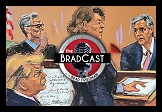 Trump Trial Ketchup: Cohen, a 'Smoking Gun', and 'The Cult of Trump': 'BradCast' 5/15/24
Trump Trial Ketchup: Cohen, a 'Smoking Gun', and 'The Cult of Trump': 'BradCast' 5/15/24  LAPD Right-Wing Bias in Violent Response to UCLA Protest Was No Surprise
LAPD Right-Wing Bias in Violent Response to UCLA Protest Was No Surprise Could Ohio Repubs REALLY Keep Biden Off the Ballot?!: 'BradCast' 5/14/24
Could Ohio Repubs REALLY Keep Biden Off the Ballot?!: 'BradCast' 5/14/24 'Green News Report' 5/14/24
'Green News Report' 5/14/24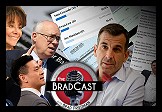 Recount in Tied U.S. House Primary Highlights Probs in CA Law: 'BradCast' 5/13/24
Recount in Tied U.S. House Primary Highlights Probs in CA Law: 'BradCast' 5/13/24 Sunday 'Stormy Weather Continues' Toons
Sunday 'Stormy Weather Continues' Toons Facing Down the Threat to American Democracy: 'BradCast' 5/9/24
Facing Down the Threat to American Democracy: 'BradCast' 5/9/24 'Green News Report' 5/9/24
'Green News Report' 5/9/24 Trump Trial Ketchup:
Trump Trial Ketchup: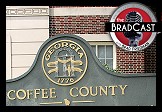 New Cybersecurity Breach in Coffee County, GA: 'BradCast' 5/7/24
New Cybersecurity Breach in Coffee County, GA: 'BradCast' 5/7/24 'Green News Report' 5/7/24
'Green News Report' 5/7/24 2024 Electoral -- and Climate -- Omens: 'BradCast' 5/6/24
2024 Electoral -- and Climate -- Omens: 'BradCast' 5/6/24 Sunday 'Self Reflecting' Toons
Sunday 'Self Reflecting' Toons 'Green News Report' 5/2/24
'Green News Report' 5/2/24 Pro-Palestine Protests, Proportionality, and Political Perspective: 'BradCast' 5/2/24
Pro-Palestine Protests, Proportionality, and Political Perspective: 'BradCast' 5/2/24 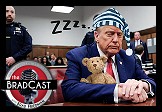 Trump Trial Ketchup: Criminal Contempt and His Two-Tier Justice: 'BradCast' 5/1/24
Trump Trial Ketchup: Criminal Contempt and His Two-Tier Justice: 'BradCast' 5/1/24 CANNING: Third-Party Myopia v.
CANNING: Third-Party Myopia v. A Few Hits of Dopamine for Your Listening Pleasure: 'BradCast' 4/30/24
A Few Hits of Dopamine for Your Listening Pleasure: 'BradCast' 4/30/24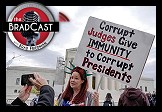 SCOTUS Corruption on Full Display at Trump 'Immunity' Hearing: 'BradCast' 4/29/24
SCOTUS Corruption on Full Display at Trump 'Immunity' Hearing: 'BradCast' 4/29/24 Trump's Ridiculous 'Immunity' Case Heard by Corrupted SCOTUS: 'BradCast' 4/25/24
Trump's Ridiculous 'Immunity' Case Heard by Corrupted SCOTUS: 'BradCast' 4/25/24 NY Trump Trial Mid-Week Ketchup: 'BradCast' 4/24/24
NY Trump Trial Mid-Week Ketchup: 'BradCast' 4/24/24 'Election Fraud, Pure and Simple': 'BradCast' 4/23/24
'Election Fraud, Pure and Simple': 'BradCast' 4/23/24
 VA GOP VOTER REG FRAUDSTER OFF HOOK
VA GOP VOTER REG FRAUDSTER OFF HOOK Criminal GOP Voter Registration Fraud Probe Expanding in VA
Criminal GOP Voter Registration Fraud Probe Expanding in VA DOJ PROBE SOUGHT AFTER VA ARREST
DOJ PROBE SOUGHT AFTER VA ARREST Arrest in VA: GOP Voter Reg Scandal Widens
Arrest in VA: GOP Voter Reg Scandal Widens ALL TOGETHER: ROVE, SPROUL, KOCHS, RNC
ALL TOGETHER: ROVE, SPROUL, KOCHS, RNC LATimes: RNC's 'Fired' Sproul Working for Repubs in 'as Many as 30 States'
LATimes: RNC's 'Fired' Sproul Working for Repubs in 'as Many as 30 States' 'Fired' Sproul Group 'Cloned', Still Working for Republicans in At Least 10 States
'Fired' Sproul Group 'Cloned', Still Working for Republicans in At Least 10 States FINALLY: FOX ON GOP REG FRAUD SCANDAL
FINALLY: FOX ON GOP REG FRAUD SCANDAL COLORADO FOLLOWS FLORIDA WITH GOP CRIMINAL INVESTIGATION
COLORADO FOLLOWS FLORIDA WITH GOP CRIMINAL INVESTIGATION CRIMINAL PROBE LAUNCHED INTO GOP VOTER REGISTRATION FRAUD SCANDAL IN FL
CRIMINAL PROBE LAUNCHED INTO GOP VOTER REGISTRATION FRAUD SCANDAL IN FL Brad Breaks PA Photo ID & GOP Registration Fraud Scandal News on Hartmann TV
Brad Breaks PA Photo ID & GOP Registration Fraud Scandal News on Hartmann TV  CAUGHT ON TAPE: COORDINATED NATIONWIDE GOP VOTER REG SCAM
CAUGHT ON TAPE: COORDINATED NATIONWIDE GOP VOTER REG SCAM CRIMINAL ELECTION FRAUD COMPLAINT FILED AGAINST GOP 'FRAUD' FIRM
CRIMINAL ELECTION FRAUD COMPLAINT FILED AGAINST GOP 'FRAUD' FIRM RICK SCOTT GETS ROLLED IN GOP REGISTRATION FRAUD SCANDAL
RICK SCOTT GETS ROLLED IN GOP REGISTRATION FRAUD SCANDAL VIDEO: Brad Breaks GOP Reg Fraud Scandal on Hartmann TV
VIDEO: Brad Breaks GOP Reg Fraud Scandal on Hartmann TV RNC FIRES NATIONAL VOTER REGISTRATION FIRM FOR FRAUD
RNC FIRES NATIONAL VOTER REGISTRATION FIRM FOR FRAUD EXCLUSIVE: Intvw w/ FL Official Who First Discovered GOP Reg Fraud
EXCLUSIVE: Intvw w/ FL Official Who First Discovered GOP Reg Fraud GOP REGISTRATION FRAUD FOUND IN FL
GOP REGISTRATION FRAUD FOUND IN FL


































